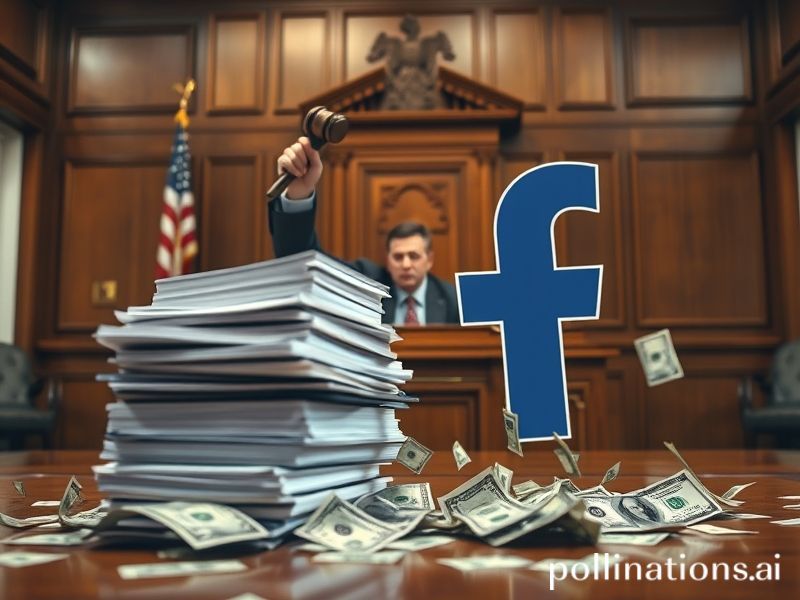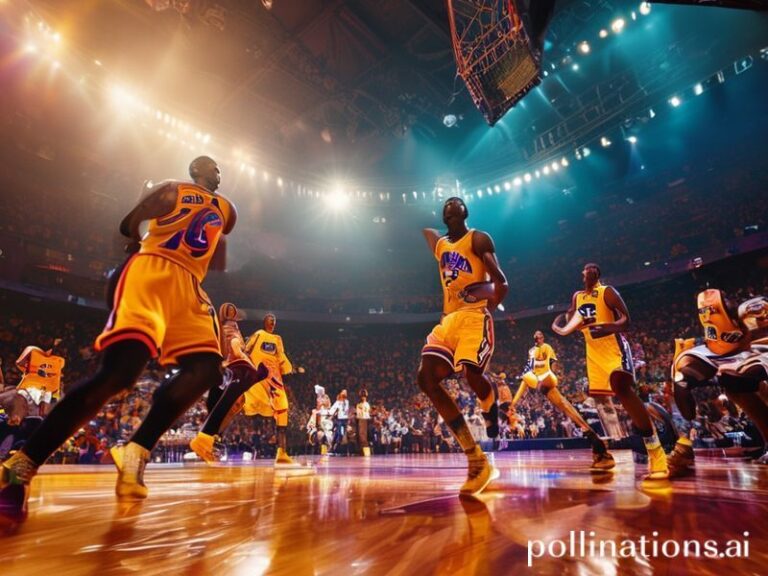Meta’s $725 Million Global Receipt: How a Privacy Lawsuit Settles Nothing—Everywhere
Facebook Finally Pays Up: A $725 Million Receipt for the Global Panopticon
By Our Correspondent Somewhere Slightly East of Disillusionment
If you listen closely across the world’s time zones, you can almost hear the synchronized sigh of relief emanating from Menlo Park—part exhale, part suppressed giggle—as Meta agrees to cut a $725 million cheque to settle that quaint class-action lawsuit accusing it of leaking, selling, or otherwise treating 87 million user profiles like Pokémon cards. From Berlin to Bangkok, the settlement is being greeted with the same measured enthusiasm usually reserved for a lukewarm airport sandwich: edible, technically, but nobody’s pretending it’s Michelin-star cuisine.
Europe, ever the connoisseur of privacy scandals, responded with characteristic Gallic shoulder-shrugging. The French muttered something about “le même cirque” before returning to their state-mandated 35-hour workweek. Meanwhile, German regulators—who still remember life under both Gestapo filing cabinets and Stasi filing cabinets—took the news as proof that American tech giants view GDPR fines as a mildly exotic cover charge for the discotheque of European data. The Irish Data Protection Commission, whose headquarters are conveniently located within jogging distance of Facebook’s European HQ, issued a statement best summarized as “We’re shocked, shocked! … but we’ll keep the tab open.”
Across the Atlantic in Brazil, the settlement was reported between updates on deforestation and football; local commentators noted that $725 million is roughly the cost of three days of Amazonian timber extraction, giving Brazilians a handy new unit of measurement: one “Meta,” equal to 0.8 football transfers or 1.2 political bribes. In India, where WhatsApp forwards have replaced the family astrologer, citizens greeted the news with memes depicting Mark Zuckerberg as a benevolent uncle distributing digital alms—never mind that the average payout, once attorneys feast, may cover a single plate of Mumbai street chaat, hold the sev.
For the Global South, the settlement is less a reckoning than a clearance sale. Kenya’s “Silicon Savannah” entrepreneurs watched the headlines while riding home in boda-bodas plastered with “Free Basics” stickers—Facebook’s earlier philanthropic drive that looked suspiciously like a customer-acquisition funnel. Nigerian tech Twitter reminded everyone that Cambridge Analytica’s psychographic magic was field-tested on their 2015 elections before being exported to Brexit and Trump. Call it data neocolonialism with same-day delivery.
China, which solved the privacy problem by making Facebook illegal, offered no comment, although state media ran a chyron translating “class-action settlement” as “capitalist auto-da-fé.” Russia took notes for the next iteration of election meddling, apparently concluding that if you’re going to be fined anyway, you might as well monetize the sequel.
The broader significance? A quarter-billion users will soon receive an email beginning with “Dear Valued Community Member,” followed by a paragraph of legalese dense enough to bend light. Most will delete it faster than you can say “shadow profile.” Somewhere in a Geneva co-working space, a blockchain evangelist is already pitching a decentralized replacement that promises the same dopamine drip without the pesky lawsuits—terms and conditions, of course, subject to the whims of whoever buys the protocol next Tuesday.
Financial markets, those finely tuned barometers of human denial, barely blinked. Meta’s stock dipped 0.3 % before closing up 1.1 % on rumors the company will recoup the loss by selling ads for class-action-check-cashing apps. Analysts call it “synergy”; the rest of us call it the ouroboros eating its own terms of service.
So what have we learned? That when the surveillance economy finally sends you a dividend, it arrives as a rounding error wrapped in an NDA. That privacy, once the lonely obsession of tinfoil-hat enthusiasts, is now a line item between marketing and legal. And that somewhere in an air-conditioned server farm, our aggregated hopes, fears, and browser histories continue to metastasize into quarterly earnings—because in the attention economy, the only thing more infinite than human credulity is the capacity to monetize it twice.
Bon appétit, Earthlings. Don’t spend that settlement all in one app.







